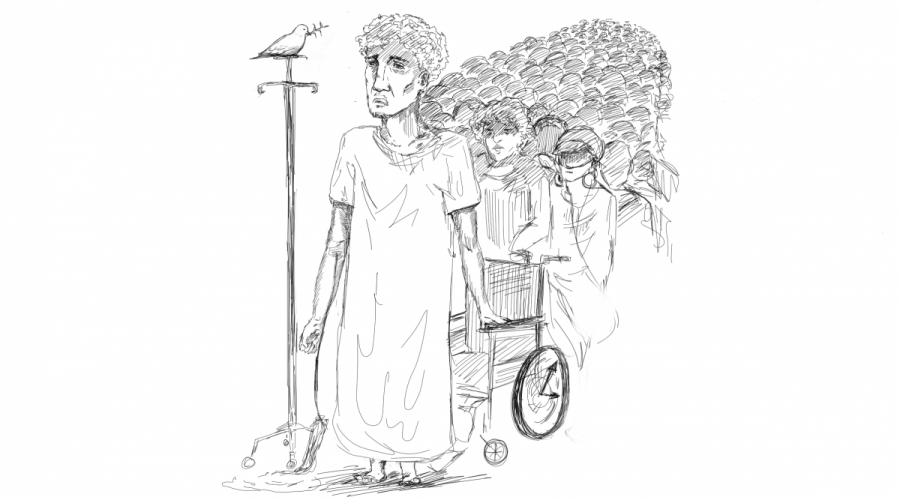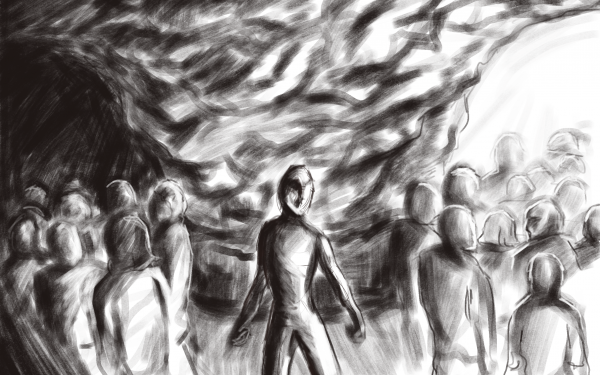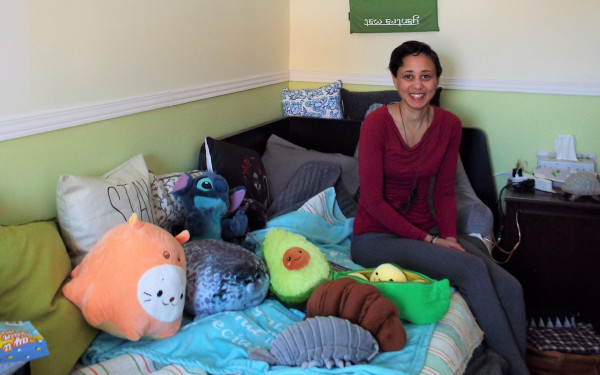Backed Into a Corner
The Consequences of Medical Suicide Expansion on the Disabled Community
“If the choice came down to being dead or being homeless, I would choose to be dead every day of the week,” said Amir Farsoud, a 54-year-old man from St. Catharines, Ontario.
Farsoud submitted a request for medical assistance in dying in October 2022. Following a childhood back injury, he has dealt with spinal stenosis, degenerative disc disease and osteoarthritis.
Over decades, other health issues arose, he explained. He also deals with chronic obstructive pulmonary disease, severe asthma, a weak heart and is currently in a pre-diabetic range because of the inability to afford a healthy diet.
Though he had considered medical suicide ever since Canada legalized the procedure in 2016, his decision to apply for MAID was accelerated after he realized he would no longer be able to afford his medical bills or his rent once his lease expired.
Farsoud criticized the government for a lack of financial help. “The fact that I [applied for MAID] now, as opposed to 15 years from now, is because both the federal and provincial government […] seem to think that disabled people aren’t people.”
At the beginning of the pandemic, the Canadian government gave a one-time payment of up to $600 to disabled individuals to help those living with disabilities. For Farsoud, this one-time payment is by no means enough to live a dignified life. He pointed to the Canada Emergency Response Benefit to illustrate his point. CERB provided working Canadians with $2,000 a month during the pandemic. Meanwhile, individuals unable to work due to disability make significantly less. At the federal level, individuals with disabilities may also qualify for a registered disability savings plan, receiving a maximum of $3,500 per year.
Meanwhile, provincial disability insurance has not been much help either, said Farsoud. “The conditions that the average person on disability, regardless of province, are conditions that would sicken the average Canadian.” For instance, in the Quebec Pension Plan, people under the age of 65 with permanent disabilities may receive a fixed amount of $524.61 per month, with an additional amount depending on the individual’s former employment earnings.
Given his reality, and having previously faced homelessness in his youth, Farsoud felt like MAID was his only dignified option. “The dignity that you refuse to give me in life, perhaps you will be kind enough to give it to me in death,” he said.
Previously, people with disabilities were ineligible for MAID. Bill C-7 changed that. Farsoud qualified for MAID as a result. In March 2021, the Canadian Senate expanded the eligibility criteria by removing the requirement that MAID recipients be “in an imminent death situation,” said disability activist and Concordia graduate Alicia-Ann Pauld.
As of the change, anyone eligible for free healthcare in Canada over the age of 18, who is mentally apt—meaning you are “capable of making health care decisions for yourself”—and suffering from a “grievous and irremediable medical condition” can apply.
The remaining condition is that the person in question is not being pressured by external factors and has given informed consent. In 2017, Pauld was diagnosed with muscular dystrophy, a progressive disability that affects mobility. Because of Bill C-7, she is now eligible for assisted suicide.
In Quebec, there are several steps patients must take when applying for MAID. Rosangela Chiarappa, psychologist in the oncology and chronic illnesses departments at Santa Cabrini hospital, provided insight into the process.
“The conditions that the average person on disability, regardless of province, are conditions that would sicken the average Canadian.” — Amir Farsoud
First, the patient must make a written request with a witness present. Afterwards, the request is evaluated by two independent, unbiased doctors, Chiarappa explained. The assessment process takes at least 90 days.
As a member of the Groupe interdisciplinaire de soutien, a group of specialists offering support to medical professionals receiving demands and evaluating complex cases, Chiarappa described how this assessment takes place. “We really want to see where the request is coming from,” she said.
Many questions are asked at this stage. “Is the person being intimidated in any way to make this choice? Is the decision coming from them, or is there pressure from outside sources?” Such external factors can include family pressure, feeling like a burden, mental health struggles and financial difficulties, among others, Chiarappa said.
During this period, patients must be informed of their alternative options, Chiarappa added. After the assessment is over, MAID can legally be administered. However, “up until the last minute, [patients] can change their mind,” she stressed.
The current-day struggles facing disabled communities offer insight into the impact of Bill C-7. The Canadian Survey on Disability found that 6.2 million Canadians above the age of 15 suffer from at least one disability.
Moreover, since Bill C-7’s introduction, Chiarappa has noticed a spike in MAID requests. MAID deaths in 2021 have increased by 32.4 per cent from the previous year. Quebec reported 3,281 deaths last year alone—the highest across all provinces.
As MAID requests rise, cases like Farsoud’s risk becoming more frequent. His hidden intentions for applying for MAID fell right through the cracks.
Opponents of the law have claimed that Bill C-7 is undeniably a response to the financial strain the disabled community puts on federal and provincial governments. “This is a money thing—it's flat-out eugenics,” argued Pauld. “It’s killing the people at the bottom to reinvest money in the people at the top.”
Pauld undoubtedly believes “that passing Bill C-7 was a mistake.” She also suggested cases were on the rise because the disabled community is being pushed by the government to opt for MAID for the wrong reasons, namely inaccessibility and financial difficulties.
The MAID expansion is a quick fix to help the government save money, Pauld claimed. Even before Bill C-7 was enacted, a report done by the Canadian Medical Association Journal in 2017 discovered that medically assisted suicide reportedly saves between $34.7 million and $136.8 million annually in the Canadian healthcare system. It is unclear how much has been saved since the bill was passed.
Advocates for Bill C-7, such as Dying With Dignity, an organization promoting MAID, continue to welcome Bill C-7 with “relief and gratitude,” believing it provides the opportunity for disabled individuals to stop suffering and die “a peaceful death.”
“This is a money thing—it’s flat-out eugenics. It’s killing the people at the bottom to reinvest money in the people at the top.” — Alicia-Ann Pauld
Despite refusing an interview, Sarah Dobec, communications specialist for DWD, stated in an email to The Link that patients “cannot be approved for MAID because of a lack of social supports,” emphasizing “the rigorous criteria” they must fill. Yet, testimonies of members of the disabled community prove otherwise.
For instance, the clogged healthcare system makes it difficult for community members to access resources and safe housing, Pauld said. She recounted one instance in particular where she had made a request to install grab bars in her shower. The wait time shocked her. Facing the likelihood of being unable to shower for an estimated two months, she opted to have a private company install them—a service which can cost several hundreds of dollars.
Pauld also pointed to the long wait times to be seen by a doctor. A study conducted by the Canadian Family Physician group has found Quebecers wait for an average of 14.8 weeks to be seen by a specialist.
Once disabled individuals have their accessibility needs filled, another problem comes up—costs. The disabled community is still disproportionately affected by poverty. Statistics Canada found that 23 per cent of disabled people lived below the poverty line, compared to nine per cent of those living without a disability. Meanwhile, 1.6 million disabled Canadians cannot afford “required aids, devices or prescription medications.”
People like Farsoud are consistently let down by the government and can only hope for miracles. Luckily for him, he was granted one. Upon sending a thank you to Ontario Member of Provincial Parliament Chris Glover for his work advocating to increase the Ontario Disability Support Program, his situation changed. Glover went to meet Farsoud, paid for his medication and ensured his story was shared in media outlets.
Once Farsoud’s story broke, an anonymous donor made a GoFundMe page for Farsoud, where his cause has currently amassed over $60,000. He has since stopped his MAID request. “I think when it comes to the disabled, the reason why more isn’t done isn’t the lack of will, but it is the lack of knowledge,” he said.
As more cases like those of Farsoud and Pauld arise, the lack of resources facing the community becomes more apparent, pressuring the government to act.
Chiarappa believes that the rising concerns of the disabled community are yet another example of the government’s need to provide sufficient social services. “[MAID] is another tool but there is so much that is missing that needs to be worked on in parallel,” she said. “One doesn’t exclude the other.”
“At the same time, there’s a crying need for services,” said Chiarappa.
This article originally appeared in Volume 43, Issue 6, published November 8, 2022.







_600_375_90_s_c1.jpg)